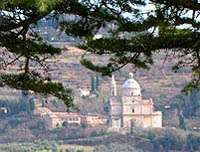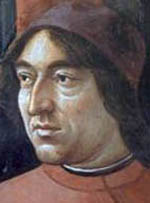Gallery of Philologists
Angelo Poliziano
14 July 1454 - 24 Sept 1494
Angelo Ambrogini (July 14, 1454 – September 24, 1494), best known as Poliziano or Politianus from his birthplace, Montepulciano in central Tuscany, was a Florentine classical scholar and poet, a leading figure in the revival of Humanist Latin, and an early codifier of philological technique.
His father, Benedetto, a distinguished jurist, was murdered by political antagonists for adopting the cause of Piero de Medici in Montepulciano. That circumstance gave his eldest son, Angelo, a claim on the Medici family. He thus early found the sort of patronage that had long eluded his predecessor Valla. At ten Angelo went to Florence to study Latin and Greek, and quickly distinguished himself as a prodigy. At thirteen he began to circulate letters in Latin; at sixteen he translated Books II-V of the Iliad into Latin hexameters; at seventeen he was versifying in Greek; at eighteen he published an edition of Catullus. All this brilliance attracted the attention of Lorenzo de' Medici, the autocrat of Florence and the chief patron of learning in Italy, who took Poliziano into his household, made him the tutor of his children, and secured for him a professorship in the University of Florence. This remained his situation to the end of his life, a quiet one in which he trained students from Italy, but also from Germany, England, and Portugal, in this way influencing scholars from one end of Europe to the other. For a still wider public he published the notes of his courses on Ovid, Suetonius, Statius, Pliny the Younger, and Quintilian. His work on the Pandects of Justinian I, though not of high rank as a work of erudition, stimulated the wider study of Roman law.
His fluency as a poet and translator was an important part of his effectiveness. He used his own didactic poem Manto, a panegyric of Vergil, to introduce his course on Vergil. His Latin versions of some of the Greek classics, including Hippocrates and Galen as well as Plato's Charmides, were highly regarded at the time, as was a collection of Tuscan songs based on various forms of popular poetry (his patron Lorenzo was concerned to revitalize Tuscan culture). Poliziano's Italian opera Orfeo was performed at Mantua. He was an important figure in the line of development of Italian poetry, leading a generation later to Ariosto. Here too, he represents a stage beyond that of Valla, and further toward the emergence of the European local languages.
Lorenzo died on 8 April 1492; Poliziano wrote a funeral ode. Let a word here be added on the role of Lorenzo "The Magnificent," who not only supported scholars and artists (among them Pico della Mirandola and Michelangelo), but sustained their labors by creating libraries in which the manuscripts of the classics could be collected and made available to scholarship. Poliziano's own most lasting contribution is of similar scope. In the critical and philological essays published in 1489 as the Miscellanea, he created the form in which later philologists would share their discoveries with each other. In effect, he established a new medium of scholarly communication. He brought philology out of the margin and onto the page.
Readings
- Anthony Grafton. Joseph Justus Scaliger.
2 Oct 2006 / Contact The Project / Exit to Gallery Index Page

